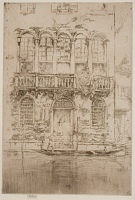The Balcony | ||
| Number: | 202 | |
| Date: | 1879/1880 | |
| Medium: | etching and drypoint | |
| Size: | 298 x 203 mm | |
| Signed: | butterfly at upper left | |
| Inscribed: | no | |
| Set/Publication: | 'Second Venice Set', 1886 | |
| No. of States: | 19 | |
| Known impressions: | 56 | |
| Catalogues: | K.207; M.204; W.177 | |
| Impressions taken from this plate (56) | ||
KEYWORD
architecture, balcony, boat, building, canal, dress, gondola, palace, people, Renaissance architecture.
TITLE
Whistler and cataloguers usually called this 'The Balcony'. Examples are:
'The Balcony' (1882, Whistler). 1
'The Balcony' (1886, Dowdeswell's). 2
'Balcony Venice' (1890/1891, Whistler). 3
'The Balcony' (1886, Frederick Wedmore (1844-1921)). 4
The title of the etching listed by Whistler in 1882 'The Balcony' and as published in 1886 was accepted by cataloguers from Wedmore on.
'The Balcony' (1882, Whistler). 1
'The Balcony' (1886, Dowdeswell's). 2
'Balcony Venice' (1890/1891, Whistler). 3
'The Balcony' (1886, Frederick Wedmore (1844-1921)). 4
The title of the etching listed by Whistler in 1882 'The Balcony' and as published in 1886 was accepted by cataloguers from Wedmore on.
1: Whistler to T. McLean, 28 August 1882, GUW #13643.
2: A Set of twenty-six etchings of Venice.
3: List, GUW #13236.
4: Wedmore 1886 A (cat. no. 177).
DESCRIPTION
A view of a three-storey building, seen directly across a canal. A low, punt-like boat is moored at the central watergate, where steps lead to an open doorway. Above the door is a round arch covered with an iron grille; on each side is a round-arched window covered with a rectangular grille. Above is a balcony with stone balustrade, with some cloth hanging over it at right. Several figures stand on the balcony at right. Behind the balcony are five tall windows with round arches supported by columns. On the next floor three small windows, the middle with opened shutters, partly appear. To the right of the palace is a low building with a projecting upper storey, in which is a window with opened shutters. In front of the building, just behind the right corner of the palace, two women and a child are just visible.
SITE
A small Renaissance house, No. 66 Santa Croce, facing east onto the narrow Rio de San Pantalon, just north of the church of San Pantalon in the city of Venice, Italy. It is on the border of the sestieri of Santa Croce and Dorsoduro, near where Whistler lived during the first winter. 5
5: Grieve 2000, pp. 40, 43-44; MacDonald 2001, chap. 4.
DISCUSSION
The composition is almost geometric, with the façade drawn parallel to the edge of the plate, and the details of balustrade, window-panes and ironwork skilfully differentiated, but the figures play an important and rather theatrical role in the composition:
'The eye is drawn to the dainty figure of a woman in the doorway, with a gondolier, bowing before her, and a group looking over the balcony, with the air of courtiers at a levée. Whistler created his poetic impression of a Venice spanning the centuries, by combining an incident from contemporary life, a balcony scene comparable to the theatrical "history" paintings of Eugen de Blaas, and a crumbling Renaissance palace.' 6
6: MacDonald 2001, chap. 4.

